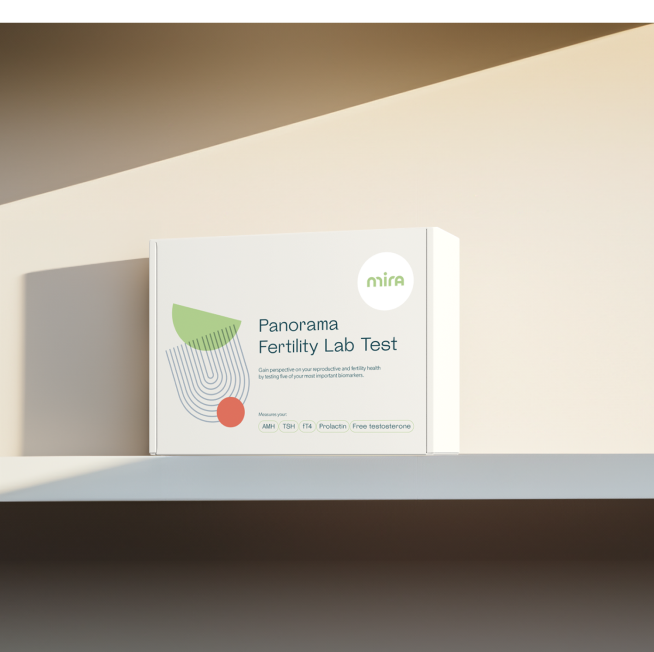Low (or Slow Rising) hCG Levels – What It Means for Your Pregnancy
If you’re familiar with at-home pregnancy tests, you’re likely familiar with the hormone human chorionic gonadotropin. Also known as just ‘hCG’ or ‘beta hCG’, this is the hormone released mainly during pregnancy and used by at-home pregnancy tests to determine a positive result.

HCG is produced by the cells surrounding a developing embryo, and these cells eventually go on to form the placenta. Production of hCG kicks in almost immediately after implantation, with levels increasing rapidly during the early weeks of pregnancy.
As early pregnancy progresses, hCG levels typically follow a predictable pattern of increasing with some notable deviations and changes. If hCG levels do not follow this pattern, it could indicate a number of scenarios such as miscalculation of gestation, miscarriage, or ectopic pregnancy.
In this article, we’ll cover everything you need to know about hCG levels in pregnancy – including what it may mean if your hCG levels are lower than average, slow to rise, and what to do if you’re concerned about your hCG levels.
Understanding hCG Levels in Pregnancy
HCG is vital to pregnancy because it stimulates the corpus luteum to produce another key pregnancy hormone, progesterone, until the placenta is fully formed (usually around the start of the second trimester). Progesterone is particularly important for pregnancy because it helps to thicken the uterine lining, suppress uterine contractions, and prepare the breasts for breastfeeding.
In addition to triggering progesterone production and aiding fetal growth, hCG also supports other bodily functions over the course of a pregnancy. For example, it promotes the development of new blood vessels in the uterus as well as helping to smooth the muscle cells in the uterine wall – both critical for maintaining a pregnancy.
The table below gives the range of expected hCG levels (measured in milli-international units of hCG hormone per milliliter of blood (mIU/mL)), as indicated by the American Pregnancy Association.
| Pregnancy Week (weeks since last menstrual period – LMP) | Standard hCG range |
| 3 weeks LMP | 5-50 mIU/ml |
| 4 weeks LMP | 5-426 mIU/ml |
| 5 weeks LMP | 18-7,340 mIU/ml |
| 6 weeks LMP | 1,080-56,500 mIU/ml |
| 7-8 weeks LMP | 7,650-229,000 mIU/ml |
| 9-12 weeks LMP | 25,700-288,000 mIU/ml |
| 13-16 weeks LMP | 13,300-254,000 mIU/ml |
| 17-24 weeks LMP | 4,060-165,400 mIU/ml |
| 25-40 weeks LMP | 3,640-117,000 mIU/ml |
| Non pregnant | 55-200 mIU/ml |
Typically, hCG levels double every 48 to 72 hours for the first four weeks of a normal pregnancy. They then double every 96 hours by week 6, peak at around week 10, and then level off and remain constant for the remainder of the pregnancy.
During the weeks that follow implantation, the above hCG level thresholds serve as a guideline for the normal range in each week of pregnancy. However, it should be noted that levels can vary on a case-by-case basis. It’s also worth mentioning that in cases of multiples and twins, baseline hCG levels will be higher.
Significance of Low hCG Levels
Low or slow rising hCG levels could indicate a number of possible scenarios.
For example, a low hCG test result could mean that the estimated date of the pregnancy was miscalculated, and you are not as far along as you thought. This could happen in cases where an individual has irregular periods, isn’t tracking their menstrual cycle, or they’re unsure of the date of conception. In this scenario, further tests would be needed to determine the gestational age of the pregnancy.
Lower-than-average hCG levels may also be a sign of miscarriage. This is because the body stops all production of hCG when a miscarriage occurs. In addition to low hCG levels, low AMH (anti-müllerian hormone) levels may also indicate an increased risk of miscarriage. In one study, women with an AMH level of 0.4 ng/mL or lower had a higher risk of miscarriage over time, with the risk being highest between six and seven weeks gestation.
One way to check in on your AMH levels is with an at-home blood test – such as Mira’s Panorama Fertility Lab Test. In addition to AMH levels, this lab test can also test four additional fertility hormones including TSH (Thyroid-Stimulating Hormone), fT4 (Free Thyroxine), Prolactin, and Free Testosterone.
Lower than average hCG levels can also be a symptom of an ectopic pregnancy. This occurs when the fertilized egg grows outside of the uterus. Ectopic pregnancies can be life-threatening and require immediate medical attention. In addition to low hCG levels, common early symptoms also include vaginal bleeding, lower back pain, and pelvic pain.
It’s important to note that lower than average hCG levels are not always a cause for concern. Although the doubling guideline holds true in 85% of normal pregnancies, not all pregnancies follow this pattern and almost 8% of viable intrauterine pregnancies exhibited a slower rate of hCG rise. Your doctor will likely keep a close eye on these levels throughout the first trimester, but it’s important to remember that this isn’t the only tool they will use to monitor your pregnancy.
Exploring Slow Rising hCG Levels
When hCG levels are rising normally, you can expect them to:
- Weeks 1-4: Double every 48 to 72 hours
- Weeks 6-10: Double every 96 hours
- Weeks 10-40: Remain constant
In cases of slow rising hCG levels, hCG may continue to rise – however, it will not rise as fast compared to normal pregnancies.
In some cases, slow rising hCG levels are not necessarily a cause for concern. Research even shows that a small but significant percentage of pregnancies continue without complications, even with low rise of hCG levels.
However, in other cases, slow rising hCG levels can indicate an elevated risk of pregnancy loss. For example, if a pregnancy fails to progress, initial levels may have appeared normal but failed to rise on subsequent tests. This type of result may indicate that an individual has or will have a miscarriage. Falling hCG levels can be a sign of miscarriage, but will often be accompanied by other symptoms such as cramping, bleeding, and passing tissue or clots.
In addition to miscarriage, low or slow rising hCG levels can also indicate a blighted ovum or ectopic pregnancy.
A blighted ovum occurs when the fertilized egg attaches to the womb, but it doesn’t develop. This usually occurs early in pregnancy, and many individuals may not even know that it has taken place. Symptoms may appear as normal menstruation and you’ll likely think it’s your period. An ectopic pregnancy occurs when a fertilized egg grows outside of the uterus. Again, this can be a dangerous and life-threatening condition that requires medical attention.
If it’s early in your pregnancy and your hCG levels do not double, or they decrease compared to previous measurements, your doctor will likely issue further testing to check on the health of your pregnancy.
HCG in Special Cases: IVF and Multiple Pregnancies
HCG levels are also important in pregnancies involving in-vitro fertilization. For example, in a study of 523 pregnancies, elevated hCG levels were associated with decreased miscarriage and ectopic pregnancy rates.
A number of factors can influence hCG level results. This includes the type of embryo (fresh vs frozen) and when subsequent hCG tests were taken relative to fertilization.
However, just like with natural pregnancies, the most important thing to focus on is how fast hCG levels increase during the first trimester. Again, hCG levels should double every 48 to 72 hours during the first 1-4 weeks of pregnancy, and then double every 96 hours during weeks 6-10. IVF pregnancies that follow this rate of increase in hCG will have the highest chance of success.
Another interesting scenario occurs in cases of multiple pregnancies (i.e. twins, triplets, etc.). While there are no standardized ranges for hCG levels in pregnancies with multiples, doctors and experts estimate that hCG levels will be 30% to 50% higher compared to singleton pregnancies. This is based on medical research – for example, one study found that hCG levels were higher than average among women carrying twins compared to singleton pregnancies. Another study found that hCG levels were significantly higher and more prolonged in twin pregnancies.
However, it’s also important to remember that hCG levels can vary greatly depending on the individual and pregnancy. It is possible to have a successful twin/multiple pregnancy and also have hCG levels within the normal range of a singleton pregnancy.
Key Takeaways and Next Steps
HCG is an incredibly powerful hormone that is the driving force behind successful pregnancies.
When hCG levels are lower than average or slow to rise, this could indicate that the estimated date of gestation has been miscalculated. It could also be a sign of miscarriage, ectopic pregnancy, or a blighted ovum.
Keeping track of your menstrual cycle will enable you to calculate your (possible) pregnancy dates with more accuracy. A great way to do this is by monitoring your fertility hormones with the Mira App and Monitor. Learn more by exploring our Mira Max Kit!
Disclaimer: The Mira Hormone Monitor exclusively measures LH, E3G, PdG, and FSH. Mira can’t track hCG.
Remember – every pregnancy is unique and hCG levels can vary depending on the individual. If you are concerned about how your pregnancy is progressing, speak with your doctor. They can provide you with the best, most accurate advice for your individual situation.
FAQs
How are hCG levels used to monitor the progress of a pregnancy?
HCG levels follow a common pattern in successful pregnancies.
The typical guidance is that hCG levels should double every 48 to 72 hours within the first four weeks of pregnancy. They then double every 96 hours by week 6, peak at around week 10, and then level off and remain constant for the remainder of the pregnancy.
Doctors use hCG testing to see whether or not a pregnancy is progressing ‘normally’ – i.e. hCG levels are on track and within the common range of successful pregnancies at any given stage of gestation.
What should I do if my hCG levels are not doubling every 48 hours?
If your hCG levels are not doubling every 48 hours, your doctor may want to run further testing to assess the health of your pregnancy. This may include an ultrasound and additional hCG tests.
Are there any lifestyle factors that can affect hCG levels?
No. There are no lifestyle factors that can influence your hCG levels. Although it may be tempting to try and find ways to boost hCG, it’s important to understand that there is no diet, supplement, or exercise regime that can naturally increase hCG levels.
The best thing you can do for your pregnancy is continue your routine, keep stress levels low, and regularly check in with your doctor.
What are the next steps if my hCG levels are abnormally low or slow rising?
If your hCG levels are abnormally low or slow rising – try not to panic. Lower-than-average hCG levels are not always a cause for concern. However, your doctor will likely want to conduct further testing to assess the health of your pregnancy. This may involve additional hCG testing and an ultrasound.

Mira’s Editorial Process
All content produced by Mira meets stringent editorial standards, ensuring excellence and accuracy in language and medical precision. Every piece undergoes thorough fact-checking and review by qualified professionals. Check out our full editorial process to learn more.











